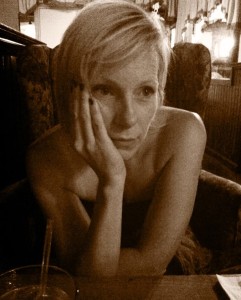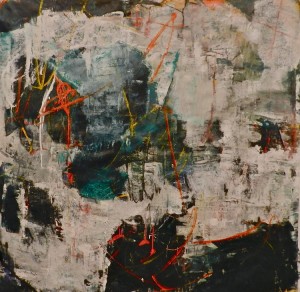Mary Akers: Thanks for agreeing to talk with me today, Terri. I loved your poem Write to Save Someone. I’m wondering, has writing always been your first artistic love? If not, what was it and how did you transition to poetry/writing?
Terri Muuss: Actually, acting, theatre and directing have always been my first loves. I came to acting quite young and naturally. It will always be a huge part of who I am and how I see art in a larger sense. Much of my poetry is born out of a theatricality I possess from being onstage these many years.
That being said, poetry was always sort of waiting in the wings for me. When I was in tenth grade, my best friend was a beautiful person and poet. I spent long days at her house after school as I had no inclination to go home to my own dysfunctional house. There, she read and wrote poetry in front of me and it certainly inspired me to use it as an avenue for expression. Later, during senior year, I had a teacher hand me a packet of poems by e.e. cummings, T.S. Eliot, Emily Dickinson and Langston Hughes that she thought I would enjoy. That packet sent me on a journey of reading as many poets as I could. Still, poetry was off to the side while theater took center stage.
It really wasn’t until I was faced with the trauma of my past and of putting myself together that writing became both a therapeutic tool and an artistic passion. To better understand the trauma of being sexually abused as a child, I wrote and wrote and wrote. Mostly poetry but also monologues. At the end, what I’d constructed was a one-woman show skeleton that became Anatomy of a Doll. I performed the show throughout New York City and then the country at conferences and in theaters. Even then, I didn’t identify myself as a writer. I thought of myself as a performer who just happened to use my writing as a script. When Veronica Golos (my friend, mentor and a gorgeous poet who’s won numerous awards) began taking an interest in my work and started editing it in a poetry workshop she led out of her house on the Upper West Side, I started to see myself in the context of being a poet and poetry as a vocation. I think the form of poetry works well to showcase the dissociation that comes with abuse much more than prose does. Veronica is still my editor, having worked on both Anatomy of a Doll and my book, Over Exposed.
But the biggest transition from actor to writer happened during my marriage to poet Matt Pasca. He’s always seen me as a writer and, before I even claimed that identity for myself, always pushed me to go deeper, to write more, to get better, to submit my work. Through our marriage I have grown as a writer and come to see myself as a poet.
MA: You write a lot about painful events and speak openly about them. Most people wouldn’t be able to do that. Where does this ability come from? What has been the reaction from friends and relatives about this openness?
TM: Many people have said they’ve seen me as courageous because I share the truth of my childhood sexual abuse, subsequent rapes, addiction and my recovery quite publicly. I have to acknowledge that this is the way it is perceived by other people. For me, however, it’s born out of necessity and so it’s never felt or seemed like courage. I have lived my life according to the 12-step saying, “You’re only as sick as your secrets.” I know that what I keep inside me, what I feel shame about, what I try to hide, will destroy me from the inside. Giving a voice to my pain and shame and grief and mistakes gives me back my power, my joy and my life.
I’ve also grown to see that if I’m hiding the fact that I was sexually abused, I am sending myself and others the message that it was somehow my fault or that there’s something for me to be ashamed of. I’ve come to understand that what happened to me was not anything that I should be ashamed of. I was the victim so why should I be ashamed. I’ve also come to understand that the sexual abuse and the rape and the violence are a part of me but they are not the entirety of me.
Lastly, if I can help someone (with my story) to recover, let go of their shame, and move into survivorhood, then it is all more than worth it. As social worker and researcher Brene Brown states, “If you put shame in a petri dish, it needs three ingredients to grow exponentially: secrecy, silence, and judgment. If you put the same amount of shame in the petri dish and douse it with empathy, it can’t survive.” I choose let go of secrecy and to douse my shame with empathy, and empathy for the world must begin with me.
Friends and relatives have been overwhelmingly supportive, although for some of them, it took a period of adjustment and listening that gave birth to deeper understanding. I surround myself with people who are willing to be empathetic, courageous, vulnerable, and honest with both me and themselves. I consider myself very lucky to have a wide circle of supportive people in my life.
MA: Are you very involved in a poetry community? Have you initiated any events? What advice do you have for readers who might be trying to do the same?
TM: I’m a licensed social worker and the macro version of social work is community organizing. The first rule of community organizing is to listen to the community. Too often, people come into a community with their own expectations and demands. They try to foist onto a community what they want to see the community have. If you’re really trying to build community, through the arts or otherwise, ask questions and be willing to hear the answers. The community might not want the same things you want for them but if community is your ultimate goal, you need to let its members be your guide. Too often in the poetry community, as in other communities, people set up an event that mirrors the kind of poetry THEY want but disregard what the community is really is looking for. Finding the right venue, format and publicity are integral to success.
My husband Matt Pasca and I run an event in Bay Shore, NY called Second Saturdays at Cyrus which has featured poets and an open mic night at Cyrus Chai & Coffee Company. The event is successful, in part, to our long-held connections in the writing and poetry scenes on Long Island and New York City, which allows us to feature very talented poets of different backgrounds. Every day there’s a poetry event somewhere in NY but usually the poetry sounds like poetry of whoever’s running it and the poets performing look a lot like them. Second Saturdays is the opposite as it showcases both the diversity of NY community and their poetry. This is one reason it is almost always standing room only. My husband, Matt has 20 years’ worth of teaching in the high school here and a deep investment in the community, and we’ve used that to let the community be aware of this space as a safe place to come and share art, community and poetry.
I would recommend to anyone trying to build a community that it’s so important to have collaborators in any community venture. Without them, burnout is a real factor. You need to be able to share the workload, bounce ideas off of each other, and laugh together to elevate stress and keep it going!
MA: Do you have any books out? What is next for you?
TM: I have two books out currently. Over Exposed is my memoir, told in both poetry and prose. Grabbing the Apple is an anthology of New York women poets that I coedited with M.J. Tenerelli. I work with a group you called the Poets of Well-being (made up of Susan Dingle, Maggie Bloomfield, Nina Yavel and I). We are all social worker-writers who are in long term recovery (we have over 100 years of sobriety between us). You can find the group on Facebook. As a group, we travel to conferences and venues to showcase how writing can be a therapeutic tool for helping others overcome addiction and abuse. We facilitated a workshop at AWP in Minnesota, at the Expressive Therapies Conference in NYC and were even invited to the 2016 NASW conference in DC. Next, I am deep into work on a new poetry manuscript with the working title “God’s Spine” which works to showcase poems around the theme of finding beauty, recovery and spirituality within ourselves and in the beauty of connection with others.



Pingback: “Write to Save Someone” by Terri Muuss | Rkvry Quarterly Literary Journal
An interview with Terri Muuss is a revelation in so many ways. Her eloquence, her capacity for empathy, an her authenticity equal her enormous talent. She is a light in our very shadowy world right now.
Fascinating insight, Terri. I’m also very taken with what you say about organizing / enabling poetry in a community. Food for thought, for sure.